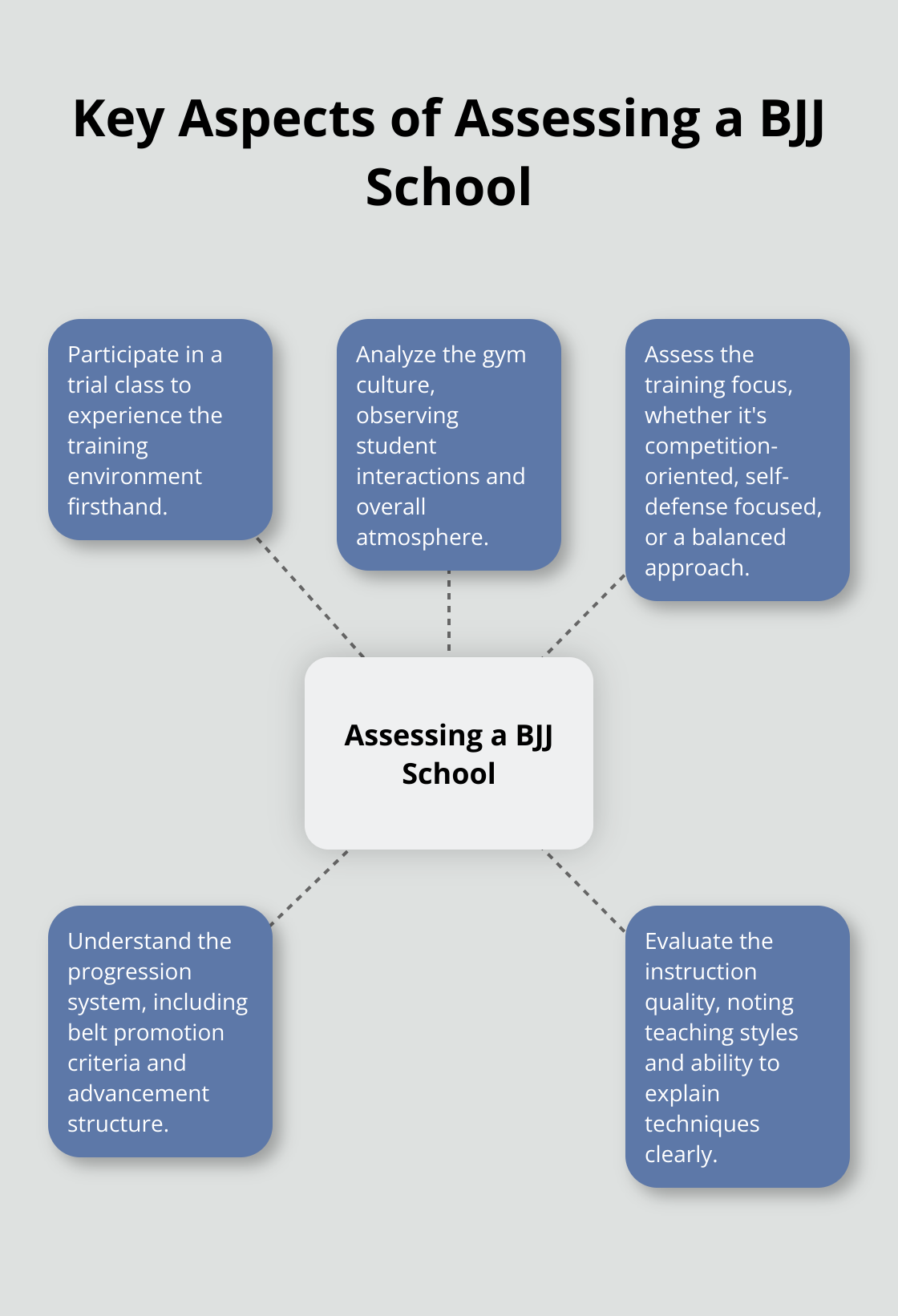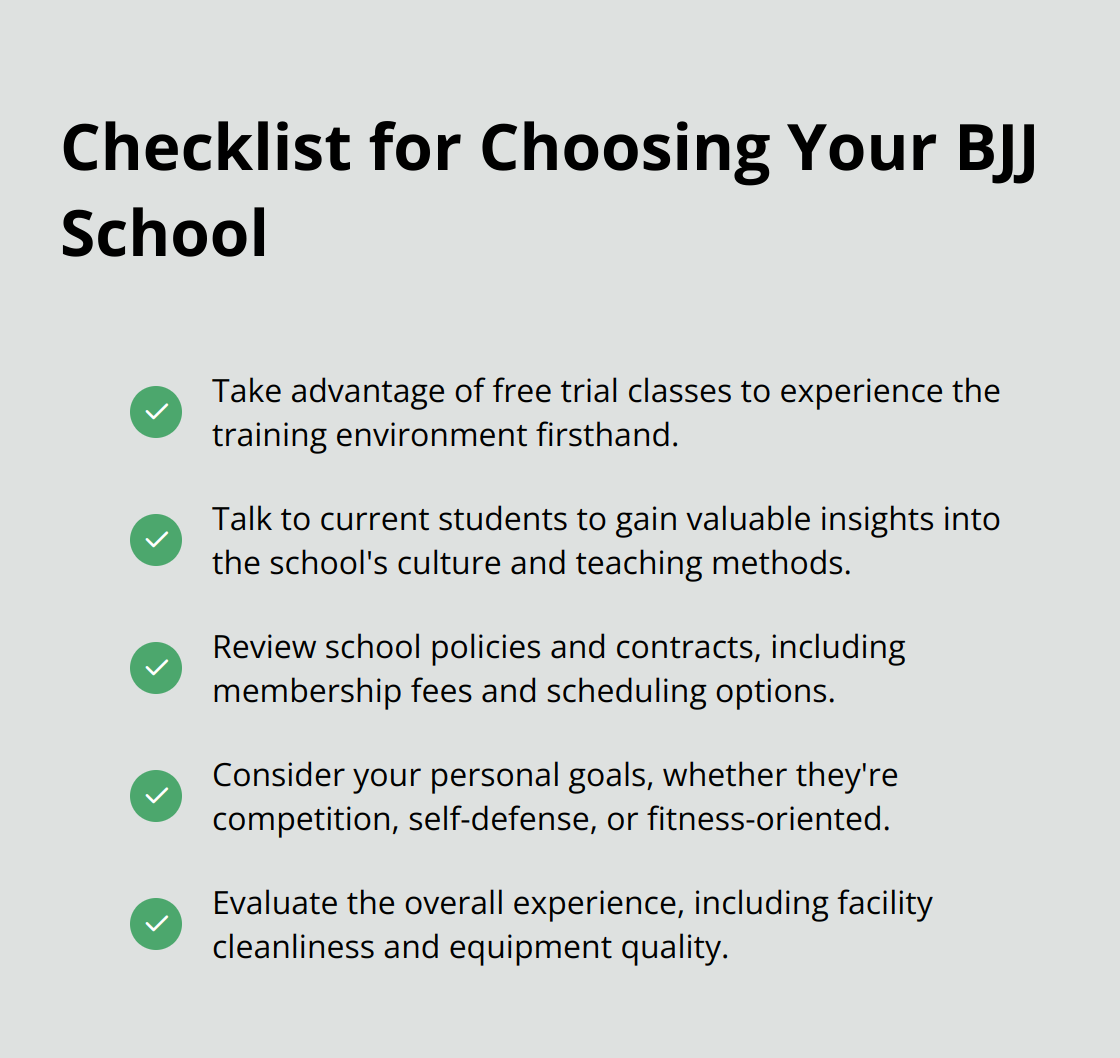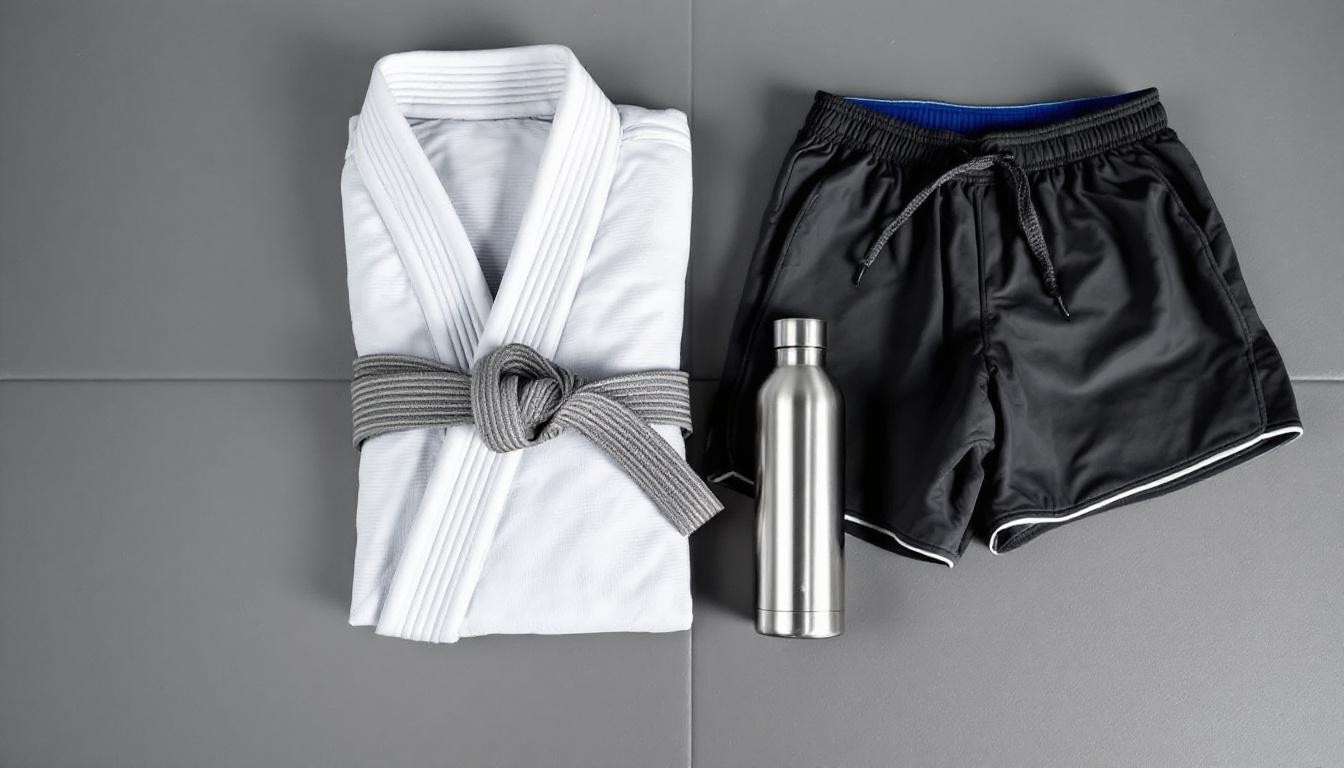At Jiu Jitsu, we understand that choosing the right Brazilian Jiu-Jitsu school is a crucial step in your martial arts journey.
Finding the perfect fit for your Jiu Jitsu classes can make all the difference in your progress and enjoyment of the sport.
This guide will walk you through the key factors to consider, helping you make an informed decision that aligns with your goals and preferences.
What Makes a Great BJJ School?
Location and Scheduling
The proximity of your BJJ school to your home or workplace impacts your training consistency. A study by the International Journal of Sports Science revealed that students who train at a gym within a 15-minute commute attend classes 73% more often. Schools that offer various class times throughout the day (like Souza Grappling Co.’s six-day schedule with morning and evening classes) accommodate diverse lifestyles.

Instructor Expertise
The quality of instruction significantly influences your progress. Experience and credentials matter when it comes to BJJ instructors. Schools with black belt instructors who have competitive experience often produce better results. Ask about an instructor’s lineage and teaching philosophy during your initial visit.
Facility Standards
A clean, well-maintained facility is essential. The American College of Sports Medicine reports that proper gym hygiene reduces the risk of skin infections by up to 80%. Inspect the mats, changing rooms, and overall cleanliness of the gym. High-quality equipment (such as Fuji or Tatami mats) enhances your training experience and reduces injury risks.
Class Dynamics
The ideal student-to-instructor ratio allows for personalized attention while maintaining a diverse training environment. Most experts agree that a 1:15 ratio achieves this balance. Observe a class to gauge the energy and interaction between students and instructors. A mix of drilling, sparring, and technique instruction typically indicates a well-rounded curriculum.
Community and Culture
The atmosphere of a BJJ school plays a vital role in your long-term commitment. A supportive and inclusive environment fosters growth and motivation. Look for schools that emphasize respect, teamwork, and continuous improvement. The right school will not only teach you techniques but also create a community that keeps you engaged in your BJJ journey.
As you evaluate these factors, consider how they align with your personal goals and values. The next section will guide you through the practical steps of assessing a BJJ school firsthand.
How to Assess a BJJ School’s Training Environment
When evaluating a BJJ school, it’s important to consider several key aspects that contribute to the overall training environment. These factors will help you make an informed decision about which school best suits your needs and goals.

Participate in a Trial Class
Most reputable BJJ schools offer free trial classes. Take this opportunity to experience the training environment directly. During the class, observe the instructor’s teaching style, the level of engagement from other students, and the overall energy in the room. Notice how instructors explain and demonstrate techniques, and whether they allocate adequate time for questions and individual attention.
Analyze the Gym Culture
The atmosphere of a BJJ school significantly impacts your training experience. Watch how students interact with each other before and after class. A supportive environment where higher belts help lower belts indicates a healthy gym culture. Look for signs of respect, camaraderie, and a positive attitude towards learning and growth.
Assess the Training Focus
Different BJJ schools emphasize various aspects of the art. Some focus heavily on competition, while others prioritize self-defense or a mix of both. During your visit, ask about the school’s philosophy and training approach. For example, some schools (like Souza Grappling Co.) offer a balanced curriculum that includes both competitive techniques and practical self-defense applications, catering to a wide range of student goals.
Understand the Progression System
Ask about the school’s belt promotion criteria and progression system. A transparent and structured approach to advancement helps students set clear goals and track their progress. Inquire about the frequency of promotions, the requirements for each belt level, and whether the school follows established standards (such as those set by the International Brazilian Jiu-Jitsu Federation).
Evaluate the Instruction Quality
Pay close attention to the quality of instruction during your trial class. Effective instructors break down complex techniques into manageable steps, provide clear explanations, and offer constructive feedback. They should also demonstrate an ability to adapt their teaching style to accommodate different learning paces and physical abilities.
The next step in choosing the right BJJ school involves practical considerations that go beyond the training environment. Let’s explore these factors to help you make a well-informed decision.
Making Your Final Decision
As you approach the final stage of selecting your BJJ school, consider the following key factors to ensure you make the best choice for your martial arts journey.

Take Advantage of Free Trial Classes
Most reputable BJJ schools offer free trial classes. Use this opportunity to experience the training environment firsthand. Observe the instructor’s teaching style, student engagement, and overall energy in the room. Pay attention to how instructors explain techniques and allocate time for questions and individual attention.
Talk to Current Students
During your trial classes, interact with current students. Their experiences provide valuable insights into the school’s culture, teaching methods, and overall satisfaction. Ask about their progress, favorite aspects of training, and any challenges they’ve faced. This information helps you determine if the school aligns with your expectations and goals.
Review School Policies and Contracts
Thoroughly examine the school’s policies and contracts before committing. Focus on membership fees, class schedules, cancellation policies, and additional costs for equipment or seminars. Some schools offer flexible scheduling with six-day availability (like Souza Grappling Co.), which can help maintain consistent training. Inquire about contract lengths and options for short-term commitments or trial periods.
Consider Your Personal Goals
Reflect on your objectives for learning BJJ. Whether you’re interested in competition, self-defense, fitness, or a combination, ensure the school’s focus matches your aspirations. Look for schools that offer a diverse curriculum (such as Jiu-Jitsu, Muay Thai, Yoga, and Self-Defense classes) to cater to various interests and skill levels.
Evaluate the Overall Experience
The right BJJ school should feel like a second home. It should challenge you, support your growth, and provide a positive environment for learning. Consider factors such as the facility’s cleanliness, the quality of equipment, and the student-to-instructor ratio. These elements contribute to a comprehensive and enjoyable BJJ journey.
Final Thoughts
Choosing the right BJJ school shapes your martial arts journey. The ideal school offers technical instruction and a supportive community that nurtures your growth. Your decision should align with your personal goals, whether you seek competitive training, self-defense skills, or overall fitness.
Trial classes, conversations with current students, and careful policy reviews will help you make an informed choice. A positive gym culture and welcoming atmosphere can significantly impact your long-term commitment to Jiu Jitsu classes. The quality of instruction, progression system, and training environment all play vital roles in your BJJ experience.
We at Souza Grappling Co. offer a range of programs, including Jiu-Jitsu, Muay Thai, Yoga, and Self-Defense (catering to various skill levels and interests). Our flexible scheduling and expert instructors create an environment where you can thrive in your BJJ journey. Trust your instincts, ask questions, and explore multiple options before you make your decision.




